Erasmus+ 2021-2027 - nowe perspektywy, szersze horyzonty
 Program Erasmus+ to program Unii Europejskiej wspierający wymianę edukacyjną, która znacząco zwiększa kompetencję jej uczestników oraz wspiera międzynarodową współpracę uczelni wyższych krajów Unii Europejskiej, krajów Europejskiego Obszaru Gospodarczego oraz krajów kandydujących.
Program Erasmus+ to program Unii Europejskiej wspierający wymianę edukacyjną, która znacząco zwiększa kompetencję jej uczestników oraz wspiera międzynarodową współpracę uczelni wyższych krajów Unii Europejskiej, krajów Europejskiego Obszaru Gospodarczego oraz krajów kandydujących.Program Erasmus powstał w 1987 roku jako program wymiany studentów. Nazwa Erasmus nawiązuje do imienia holenderskiego filozofa, teologa i humanisty, Erazma z Rotterdamu (1466-1536), który jak inni wybitni ludzie renesansu, kształcił się w wielu uczelniach w różnych krajach Europy.
25 marca 2021 roku Komisja Europejska opublikowała dokumenty związane z wejściem w życie nowej fazy programu Erasmus+ na lata 2021-2027.
Komunikat Narodowej Agencji Programu Erasmus+
Europejski budżet programu na lata 2021–2027 wynosi 26,2 miliarda euro oraz dodatkowo 2,2 mld euro z unijnego instrumentu współpracy zewnętrznej, prawie dwa razy więcej niż poprzedni program tj. Erasmus+ na lata 2014-2020. Wraz z nową perspektywą finansową poszerzono założenia Erasmusa+, który w rezultacie stał się bardziej innowacyjny i inkluzywny. Program będzie dążył do jeszcze większego włączenia społecznego oraz do wspierania ekologicznych i cyfrowych przemian, zgodnie z założeniami Europejskiego Obszaru Edukacji, dzięki któremu Unia Europejska zamierza m.in. zapewnić wszystkim młodym ludziom dostęp do edukacji i szkoleń jak najwyższej jakości, a także dać im możliwość znalezienia pracy w całej Europie.
Nowy Erasmus+ będzie także realizował założenia Europejskiego Zielonego Ładu, w tym dotował tych studentów, którzy zdecydują się korzystać z transportu niskoemisyjnego i np. dojechać na studia w wybranym kraju pociągiem zamiast samolotem. Większe finansowanie zostanie również przeznaczone na projekty promujące świadomość ekologiczną i inwestujące w działania związane z łagodzeniem kryzysu klimatycznego. Dodatkowe działania skierowane zostaną do młodzieży m.i. w ramach inicjatywy DiscoverEU 18-latkowie będą mieli możliwość otrzymania biletu kolejowego, który umożliwi im podróżowanie przez miesiąc po Europie, poznawanie kultur i mieszkańców innych krajów. Program Erasmus+ będzie również wspierał stabilność systemów kształcenia i szkolenia w obliczu pandemii.
Nowością są mieszane programy intensywne, łączące uczenie się przez internet i pracę zespołową z krótkoterminowym fizycznym wyjazdem zagranicę.
Decyzją Komisji Europejskiej AWF Poznań otrzymał Kartę Erasmus Charter for Higher Education - ECHE na lata 2021-2027. Karta uprawnia do realizacji działań w ramach Programu Erasmus+. Narodową Agencją Programu Erasmus+ i jego realizatorem w Polsce jest Fundacja Rozwoju Systemu Edukacji.
Programu Erasmus+ w sektorze szkolnictwa wyższego obejmuje następujące typy działań:
Akcja 1: mobilność edukacyjna
- Wyjazdy edukacyjne studentów i pracowników uczelni
Akcja 2: współpraca organizacji i instytucji
- Współpraca instytucji szkolnictwa wyższego na rzecz innowacji i wymiany dobrych praktyk
Działania centralne
Działania programu Erasmus+ w sektorze szkolnictwa wyższego zarządzane przez Europejską Agencję Wykonawczą ds. Edukacji i Kultury (EACEA) w Brukseli
Działania Erasmus Mundus:
- Wspólne studia magisterskie Erasmus Mundus
- Działania w zakresie opracowywania studiów Erasmus Mundus
Sojusze na rzecz innowacji:
- Sojusze na rzecz edukacji i przedsiębiorstw
- Sojusze na rzecz współpracy sektorowej
- Moduły „Jean Monnet" - krótkie programy nauczania w zakresie studiów nad UE, których minimalny czas wynosi 40 godzin dydaktycznych na rok akademicki. Moduły mogą mieć charakter interdyscyplinarny lub koncentrować się na jednej dziedzinie studiów nad UE.
- Katedry „Jean Monnet” - grant dla profesorów uniwersyteckich specjalizujących się w studiach nad UE, finansujący 90 godzin dydaktycznych kształcenia na rok akademicki.
- Centra doskonałości „Jean Monnet” - ośrodki kompetencji i wiedzy skupiające wysoko wykwalifikowanych ekspertów z obszaru studiów nad UE, upowszechniających swoją wiedzę w społeczeństwie.
Szczegółowe informacje na temat programu:
- Przewodnik po programie Erasmus+ 2021-2027
Wersja w j. polskim
Wersja w j. angielskim
- Priorities of the Erasmus+ Programme
- Materiały informacyjne na temat programu Erasmus+
- Erasmus+ - strona Komisji Europejskiej
Terminy wyjazdów stypendialnych
Formularz Learning Agreement - praktyka
Formularz Learning Agreement - studia
LA_studia_formularz
LA_studia_formularz_przyklad
LA_studia_INSTRUKCJA
wersja on-line:
On-line Learning Agreement - OLA (należy założyć swoje konto w Google)
Erasmus+ App - mobilna aplikacja z Google Play lub AppStore
Instrukcja wypełniania on-line Learning Agreement
Instrukcja wypełniania on-line Learning Agreement - film
Guidelines on how to use the Erasmus+ Learning Agreement for Studies (KA131)
Obowiązek informacyjny dla stypendystów Biura Współpracy z Zagranicą
1. Administratorem Pani/Pana danych osobowych jest Akademia Wychowania Fizycznego im. Eugeniusza Piaseckiego w Poznaniu z siedzibą: ul. Królowej Jadwigi 27/39, 61-871 Poznań (AWF). Biuro Współpracy z Zagranicy (BWZ) jest integralną jednostką organizacyjną AWF.
2. Administrator danych osobowych powołał Inspektora Ochrony Danych nadzorującego prawidłowość przetwarzania danych osobowych, z którym można skontaktować się za pośrednictwem adresu e-mail:
3. AWF posiada Państwa dane osobowe (Dane), które zostały pozyskane w związku jednym lub kilkoma z poniższych Zdarzeń (okoliczności):
a. Zawarcie umowy (porozumienia) z AWF,
b. Wyrażenie zgody w określonym zakresie dla AWF,
c. Uczestnictwo w postępowaniach prowadzonych przez AWF i trwających,
d. Uczestnictwo w postępowaniach prowadzonych przez i już zakończonych.
AWF będzie przetwarzać Państwa dane osobowe pozyskane w efekcie Zdarzeń, o których mowa w pkt. 3 w celach niezbędnych do wykonywania obowiązków lub uprawnień AWF, jakie wynikają z treści oświadczeń złożonych przez Państwa (w tym dla celów archiwizacyjnych, ewaluacyjnych, kontrolnych i statystycznych).
4. Odbiorcami Pani/Pana danych osobowych będą:
a. upoważnieni pracownicy BWZ,
b. upoważnieni pracownicy Fundacji Rozwoju Szkolnictwa i Edukacji,
c. administratorzy systemu Mobility Tool Komisji Europejskiej.
w zakresie niezbędnym do świadczenia usług w ramach zawartej z Panią/Panem umowy.
5. Ponadto AWF może przetwarzać Państwa Dane, w dobrej wierze, w następujących celach, które nie są ściśle związane ze Zdarzeniami opisanymi w pkt. 3 powyżej tzw. cele dodatkowe:
- przekazywanie informacji na temat działalności prowadzonej przez BWZ,
- przekazywanie zaproszeń na wydarzenia z udziałem BWZ,
- przekazywanie informacji marketingowych (marketingowych bezpośrednich) opracowanych przez BWZ,
- przekazywanie informacji w postaci okresowych i usystematyzowanych zbiorów informacyjnych, promocyjnych, marketingowych, zawierających zróżnicowane informacje,
- przekazywanie informacji na temat programów prowadzonych przez BWZ, które mogą Państwa zainteresować.
6. Posiada Pani/Pan prawo do żądania od administratora dostępu do danych osobowych, prawo do ich sprostowania, usunięcia lub ograniczenia przetwarzania, prawo do wniesienia sprzeciwu wobec przetwarzania, prawo do przenoszenia danych, prawo do cofnięcia zgody w dowolnym momencie.
7. AWF może być zobowiązana do przekazania (udostępnienia miejsca przechowywania) Danych do organów Fundacji Rozwoju Szkolnictwa i Edukacji, Unii Europejskiej, a także do Państw niebędących członkami Unii Europejskiej ani członkami Europejskiego Obszaru Gospodarczego, jeżeli okaże się to konieczne zgodnie z regulacjami dotyczącymi programów i projektów prowadzonych przez FRSE. Będzie się to odbywało zawsze w dobrej wierze, mając na względzie konieczność zapewnienia jak najlepszej ochrony Danych.
8. Ma Pani/Pan prawo wniesienia skargi do organu nadzorczego – Prezesa Urzędu Ochrony Danych Osobowych, ul. Stawki 2, 00 – 193 Warszawa.
9. Podanie danych osobowych jest dobrowolne, jednakże odmowa podania danych może ograniczyć lub uniemożliwić zakres świadczonych przez BWZ usług.
10. W zakresie Zdarzeń opisanych w pkt. 3, Dane będą przetwarzane (w tym także dla Celów dodatkowych) przez okres obowiązywania umowy, a także po ustaniu jej bytu prawnego przez czas nie dłuższy niż 8 lat od ustania umowy, a jeżeli po ustaniu umowy zostały podjęte w stosunku do Państwa inne czynności prawne (w szczególności dochodzenie należności), to okres 8 lat biegnie od dnia zakończenia tych czynności.
Erasmus programme
APPLICATION PROCEDURE
Application deadlines:
Autumn semester: 15 July
Spring semester: 15 November
APPLICATION FORM
The application forms should be filled in on the computer to ensure legibility. Then a signed and stamped form has to be accepted by the Institutional Programme Coordinator (email addresse: )
Application Form
LEARNING AGREEMENT FORM
Learning Agreement should be signed by the student, signed and stamped by the responsible persons at home institution. Starting from summer semester 2020/2021 a Learning Agreement document is mandatory in the form of an Online Learning Agreement (OLA) https://learning-agreement.eu/ and all the signatures are digital.
If you need some more info about OLA please visit https://learning-agreement.eu/faq
LA Form
OBLIGATIONS
This form should be signed by a student and scan sent with others documents to the host university.
Form
REGULATIONS FOR RESIDENCE
This form should be signed by a student and scan sent with others documents to the host university.
Form
REQUEST FOR EXTENSION OF ERASMUS STUDY ABROAD PERIOD
OBLIGATION AND RULES
Form
ERASMUS OFFICECONTACT
| Full Official name of the Institution in the national language: | Akademia Wychowania Fizycznego im. Eugeniusza Piaseckiego |
| English translation of the name: | Poznan University of Physical Education |
| Erasmus code | PL POZNAN08 |
| Institutional Coordinator | Mrs. Malgorzata Nawrocka, M.A. |
| Departmental Coordinators: Faculty of Sport Sciences Faculty of Health Sciences |
Mr. Wojciech Jarosz, PhD (Physical Education/Sport, Tourism, Dance), , phone:61 835 52 46, student hours: Wednesday 1.00 p.m - 2:00 p.m
|
| Telephone | + 48 61 835 50 66 |
| Postal address | ul. Królowej Jadwigi 27/39 61-871 Poznań Poland |
| Email address | |
| Website for exchange students | www.awf.poznan.pl/erasmus |
Information about AWF
HISTORY
The history of the Poznan University of Physical Education goes back to 1919 and the Department of School Hygiene and Theory of Physical Education at the newly created Poznan University. The Department was the first academic centre in Poland to train physical education specialists. The first head of the Department was professor Eugeniusz Piasecki. In 1922 the Department was included in the Medical Faculty of the University. It soon gained autonomy and became the College of Physical Education with the right to confer masters degrees.
After the Second World War, on the 15th of April 1945, the College inaugurated a new academic year. At the turn of 1949 the higher School of Physical Education was established. Its development led to organisational changes and on the 1st January 1973 the school was granted the status of the University School of Physical Education. In June 1982 the Senate of the University decided to name the University after professor Eugeniusz Piasecki, the "father of the theoretic sciences in the field of physical education".
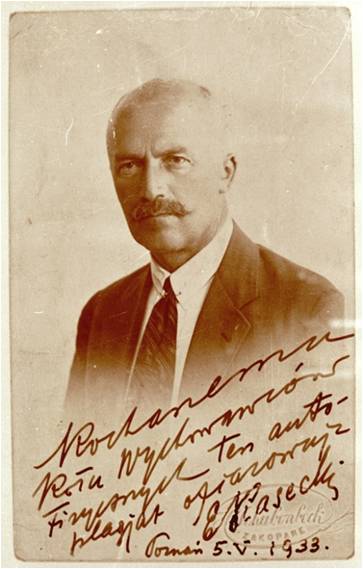
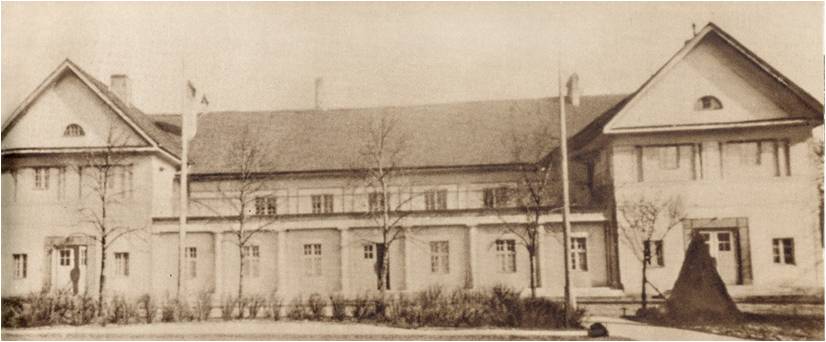
The University has been active in the field of sport at all stages of its development with students engaging in gymnastics, athletics, swimming, team sports, water sports, martial arts and many other sports as part of academic sport and in the University Sports Association club.
The students of the University included many excellent athletes, participants of the Olympic Games and Olympic medallists:
Gold medallists:
| Władysław Komar | athletics | Munich | 1972 |
| Tadeusz Ślusarski | athletics | Montreal | 1976 |
| Bronisław Malinowski | athletics | Moscow | 1980 |
| Władysław Kozakiewicz | athletics | Moscow | 1980 |
| Andrzej Wroński | wrestling | Atlanta | 1996 |
| Ryszard Wolny | wrestling | Atlanta | 1996 |
| Włodzimierz Zawadzki | wrestling | Atlanta | 1996 |
| Tomasz Kucharski | rowing | Sydney, Athens | 2000, 2004 |
| Michał Jeliński | rowing | Beijing | 2008 |
Silver medallists:
| Wiesław Maniak | athletics | Tokyo | 1964 |
| Andrzej Głąb | wrestling | Seoul | 1988 |
| Piotr Stępień | wrestling | Barcelona | 1992 |
| Rafał Szukała | swimming | Barcelona | 1992 |
| Jerzy Brzęczek | football | Barcelona | 1992 |
| Jacek Fafiński | wrestling | Atlanta | 1996 |
| Anita Włodarczyk | athletics | London | 2012 |
Bronze medallists:
| Kazimierz Zimny | athletics | Rome | 1960 |
| Andrzej Badeński | athletics | Tokyo | 1964 |
| Ryszard Katus | athletics | Munich | 1972 |
| Lucyna Langner-Kałek | athletics | Moscow | 1980 |
| Grzegorz Nowak | rowing | Moscow | 1980 |
| Izabela Dylewska | kayaking | Seoul | 1988 |
| Artur Wojdat | swimming | Barcelona | 1992 |
| Józef Tracz | wrestling | Atlanta | 1996 |
| Julia Michalska | rowing | London | 2012 |
At the Olympic Games in Sydney in 2000, the University was represented by 11 students, including seven from the Department of Physical Education, Sport and Rehabilitation in Poznań and four from the Department of Physical Culture at Gorzów Wielkopolski Campus. They were:
from Poznań:
- foilist Sławomir Mocek – 4th place;
- rower Michał Wojciechowski – 8th place in quadruple sculls;
- kayakers: Elżbieta Urbańczyk – 4th place and Michał Gajownik – 4th place;
- field hockey players: Zbigniew Juszczak, Krzysztof Wybieralski, Maciej Matuszyński,
from Gorzów Wielkopolski:
- rowers Tomasz Kucharski – gold medallist in double sculls; Rafał Głażewski – 4th place in flatwater kayaking;
- Greco-Roman wrestlers: Marek Garmulewicz – 4th place and Dariusz Jabłoński – semi-finalist.
Students of the Poznan University of Physical Education represented Poland at the Olympic Games in Athens in 2004. They were: Tomasz Kucharski (gold medallist), Magdalena Kemnitz and Sławomir Kruszkowski – rowing, Monika Drybulska – marathon.
At the Olympic Games in Beijing in 2008 our University was represented by:
- Julia Michalska and Patryk Brzeziński in rowing;
- Małgorzata Chojnacka in kayaking;
- Sławomir Mocek in foil fencing;
- Anita Włodarczyk, Monika Drybulska, Kamil Masztak and Tomasz Szymkowiak in athletics.
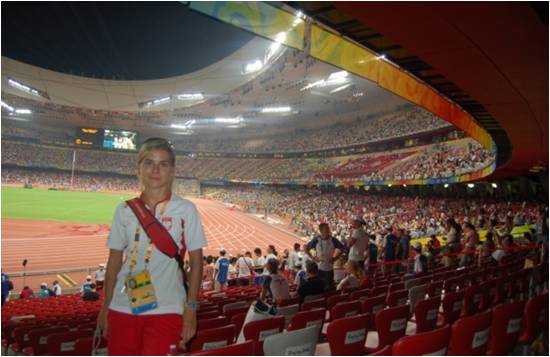
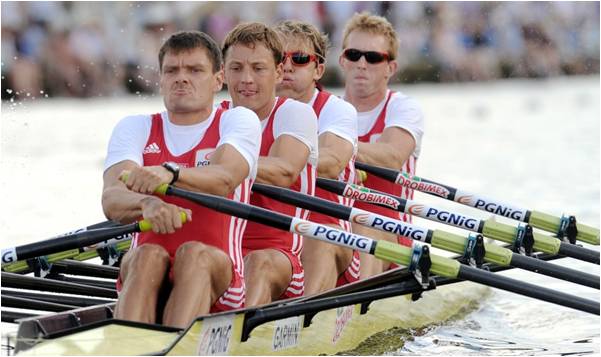
The Sydney Paralympic Games in 2000 were a success for our students:
- Anna Szymul, who won silver medals in 100 m and 400 m sprints and a bronze medal in 200 m,
- Mirosław Pych, who won a gold medal in javelin throw and a gold medal in modern pentathlon.
Outstanding martial arts athletes were our students Robert Nowak, the 1999 world vice champion in kickboxing and 2000 full-contact world champion and Wojciech Bloch in karate.
In 2009 at the World Athletics Championships in Berlin our student Anita Włodarczyk broke the world record in hammer throw and won the title of the World Champion. At the World Rowing Championship which took place in Poznań in 2009 our students Julia Michalska and Magdalena Fularczyk won the first gold medal in the history of women rowing in Poland and the titles of the World Champions and in 2010 they won a bronze medal at the World Championships in New Zealand.
The leading sport disciplines popular among students of the Poznań University of Physical Education are water sports (kayaking and rowing), martial arts (taekwondo, kickboxing, traditional karate), athletics, field hockey and fencing.The University provides higher education in physical culture and tourism for the purposes of physical education, sport, physiotherapy, tourism and recreation. It is also a leading research centre, which carries out studies in the fields related to the areas of study, mainly in humanistic and natural science foundations of physical culture and tourism. The University School cooperates with many universities abroad, participates in European educational programmes (ERASMUS+) and is a member of international scientific organisations.
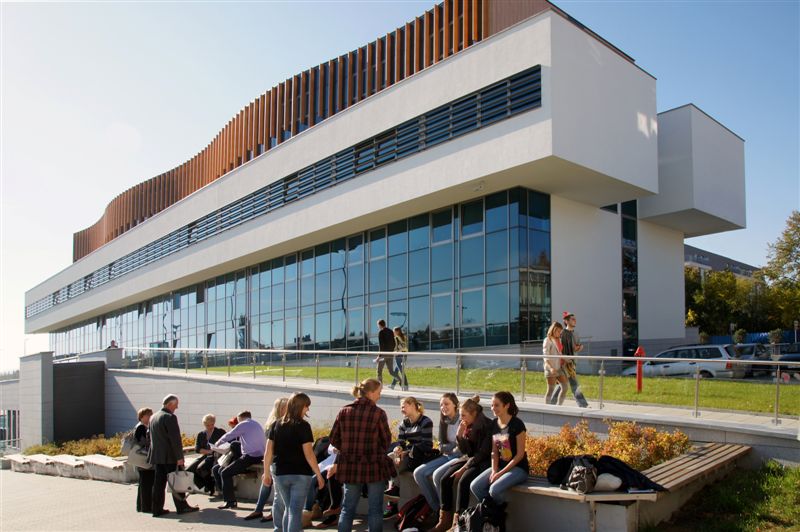
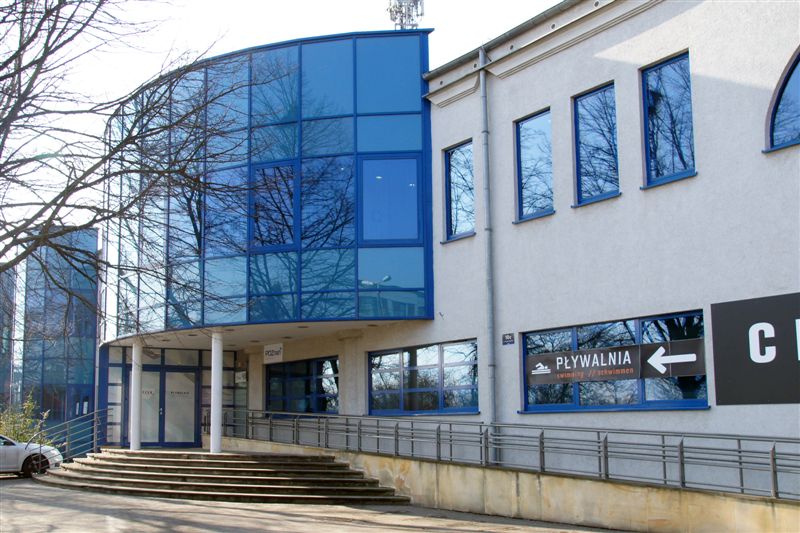
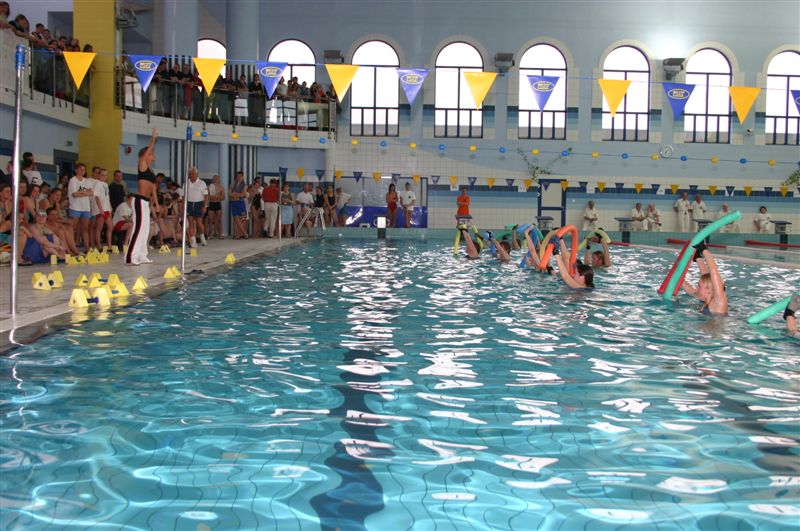
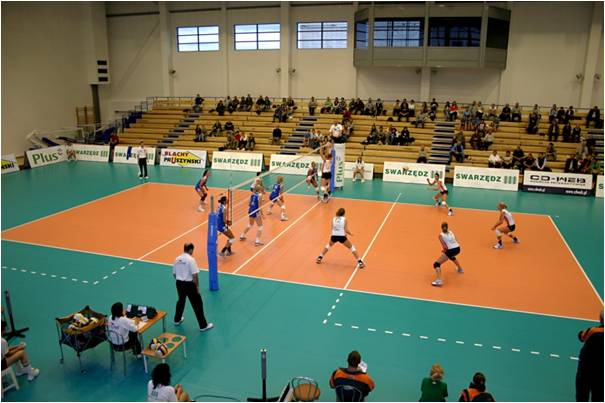
International Exchange
International Relations Office
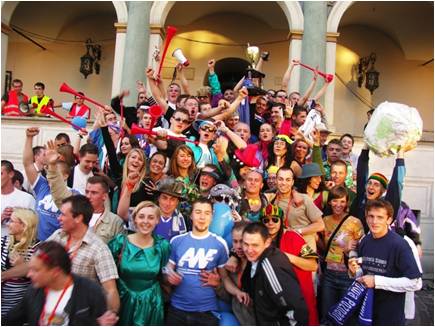 International Relations Office at the Poznań University of Physical Education promotes the idea of mobility and organises student exchange. Student exchange, both during the studies and practical placements, complements the curriculum of study at our university and provides an opportunity to gain new experience, both academically and in social and cultural aspects.
International Relations Office at the Poznań University of Physical Education promotes the idea of mobility and organises student exchange. Student exchange, both during the studies and practical placements, complements the curriculum of study at our university and provides an opportunity to gain new experience, both academically and in social and cultural aspects.Every year we offer to our students scholarships and placements abroad as part of various scholarship programmes – Erasmus+, Physical Education & Sports Academy Gerlev/Denmark, the Martial Arts Academy of Bosei/Denmark, DAAD (German Academic Exchange Service) and BUWIWM (Bureau for Academic Recognition and International Exchange).The Poznań University of Physical Education is a leading Polish sport university in terms of Erasmus activity. Students take part in partial studies in 50 most eminent European universities and take part in practical placements abroad in institutions of the profile compatible with the curriculum of studies.
The objective of the international exchange between universities all over the world is to improve the quality of teaching by developing international cooperation and to support student and staff mobility. The benefits of going abroad foreign not only strengthen the motivation for studying, but also contribute to students resourcefulness and independence. On encountering a new reality students gain more self confidence and become more open for new opportunities. At the same time they learn to respect other cultures and traditions, improve their command of foreign languages and become real Europeans.
The Careers Office
Are you looking for a job? Do you want to work as a volunteer? Do you want to take part in workshops, courses or job fairs? Come to the careers office!
An offer for students and graduates includes:
- permanent, temporary and holiday jobs in Poland and abroad,
- practical placement, voluntary work,
- meetings with employers,
- training courses, workshops on how to write your application, how to prepare to a job interview as well as workshops on self-presentation and self-employment,
- information materials on the perspectives of professional development, training opportunities.
Contact:
AWF Main Building, ul. Królowej Jadwigi 27/39 entrance A, room 204
tel./fax 61 8355104, ,
www.biurokarier.awf.poznan.pl
Students
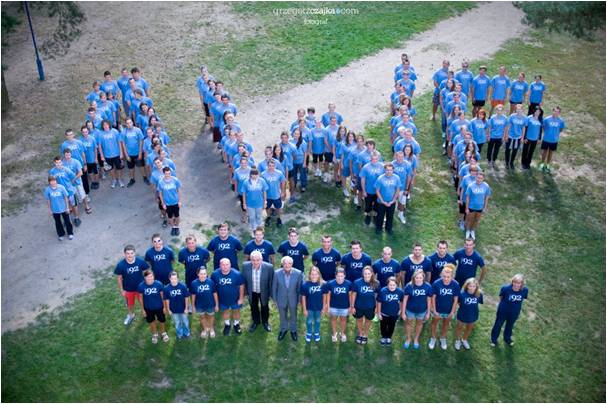 Currently, the Poznań University of Physical Education has around 4000 students, half of whom are full-time students.
Currently, the Poznań University of Physical Education has around 4000 students, half of whom are full-time students.Teaching Staff
The University employs around 350 academic teachers including 61 professors and associate professors. The faculty of physiotherapy also employs specialists in clinical courses from the Poznan University of Medical Sciences.
Scientific Research
The University departments and institutes conduct scientific research financed by the Ministry of Science and Higher Education and supported by other funds, in cooperation with many research centres in Poland and abroad. Scientific research focuses on a few basic areas, including selected features of the Polish population, factors determining physical agility and sports results, socio-historical and cultural conditions of physical culture development, the role of exercise as a preventive and therapeutic factor in metabolic diseases, pedagogy of leisure, community determined development of tourism and recreation.
Scientific Publications
Every year the University publishing house publishes about 30 new titles. These include manuals and academic texts, monographs and periodicals, including “Trends in Sport Sciences” (in English), indexed by the EBSCO Publishing, Inc and Ulrich's International Periodical Directory. So far, over seven hundred books have been published. University publications are presented at least twice a year at science book fairs and also at national and international exhibitions.
The University library
T
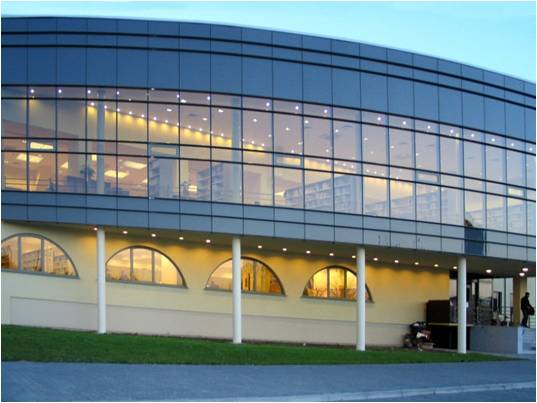 he University library network resources contain more than 80,000 volumes of books, journals, maps and audiovisual materials. The Library also subscribes to 175 current journals and newspapers. The collection focuses on physical culture, sport, physiotherapy, tourism and hospitality.
he University library network resources contain more than 80,000 volumes of books, journals, maps and audiovisual materials. The Library also subscribes to 175 current journals and newspapers. The collection focuses on physical culture, sport, physiotherapy, tourism and hospitality.The library, which since 2004 has been located in a new, modern building, provides also access to bibliographic and full-text databases, containing thousands of electronic books, journals and other documents. Wifi and 34 computers are available in the Reading Room, Research Information Centre and Circulation Desk.
Student Organisations
Student Research Clubs
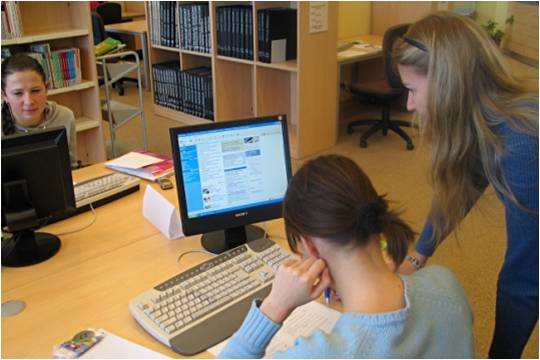 Each university should stimulate students to do research. For the majority of students however, taking part in lectures, seminars, classes and consultations with their tutors when writing the MA theses are enough to prove that science is not their passion. However, there are students who do not want to be minimalists. They take advantage of their studies to develop their professional competences and gain scientific knowledge. Their research interests are specific and they want to develop them.
Each university should stimulate students to do research. For the majority of students however, taking part in lectures, seminars, classes and consultations with their tutors when writing the MA theses are enough to prove that science is not their passion. However, there are students who do not want to be minimalists. They take advantage of their studies to develop their professional competences and gain scientific knowledge. Their research interests are specific and they want to develop them.Student research movement gives them this opportunity.
The activity in student research clubs can prepare for future research work. Many eminent professors started their careers in student research clubs. Work in a student research movement is also an advantage when writing an MA thesis, applying for doctoral studies, writing scientific articles, gaining new professional experience etc.
Student research movement at the Poznań University of Physical Education was initiated in 1967. The authorities of the University fully recognise its significance and thanks to their support and the commitment of the University staff who are coordinators of research clubs, the movement is steadily developing.
At the moment there are fourteen research clubs at the Poznan University of Physical Education. To join them you have to contact a coordinator of a Student Research Club. You can start your activity in a research club as soon as in your first year. Do not waste your chance to spend your free time in a wise and interesting way.
Sport Camps
Summer camp - Chycina
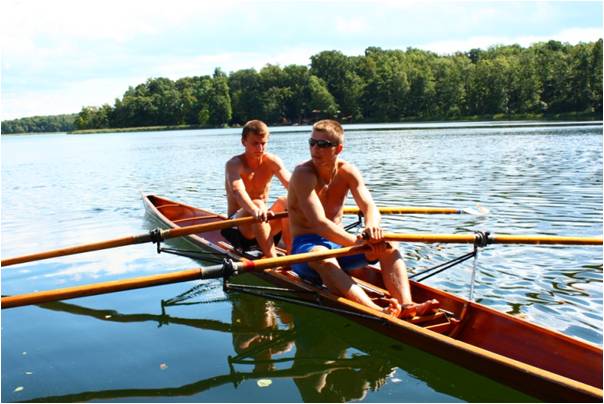 The legendary, compulsory summer camp in the University training centre in Chycina, that you will remember years later. During the 12-day camp students become familiar with the principles of organisation and running of camps, children summer camps, school field trips. Excellent location at a lake provides great conditions for students to improve their practical skills in kayaking, rowing, water-skiing, swimming in open water, diving, field games, camping and leisure time organisation.
The legendary, compulsory summer camp in the University training centre in Chycina, that you will remember years later. During the 12-day camp students become familiar with the principles of organisation and running of camps, children summer camps, school field trips. Excellent location at a lake provides great conditions for students to improve their practical skills in kayaking, rowing, water-skiing, swimming in open water, diving, field games, camping and leisure time organisation.Winter Camp
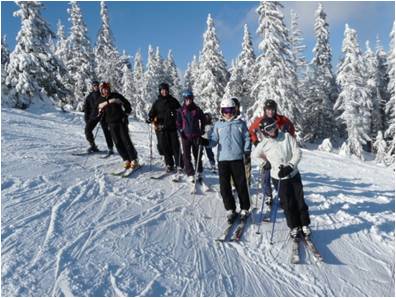 Skiing and snowboarding are the most popular forms of winter sport and recreation. Each graduate of the Poznan University of Physical Education should acquire the knowledge and skills necessary to participate in skiing and snowboarding, as they will certainly become handy in future work and in private life.If you are not a skier or snowboarder yet, you will become one at this camp! The purpose of the camp is to obtain or, for those who have tried it before, to improve basic skiing and snowboarding skills. This paves the way for further training, including acquiring instructor qualifications. During the camp students become familiar with the principles and specificity of organising winter camps.Students can choose their preferred location of camp – the Alps (Austria, Italy) or the Karkonosze mountains (Karpacz) – and the sport they want to do (skiing or snowboarding). Irrespective of your choice, you can start to learn from scratch in a beginner group or improve your skills in an advanced group. All classes are run by experienced University instructors. Students who choose snowboarding will be able to obtain qualifications of the Polish Snowboarding Association (PSZ, level 1, 2, 3). This is your passport to obtaining the PZS qualification of physical recreation instructor specialising in snowboarding.
Skiing and snowboarding are the most popular forms of winter sport and recreation. Each graduate of the Poznan University of Physical Education should acquire the knowledge and skills necessary to participate in skiing and snowboarding, as they will certainly become handy in future work and in private life.If you are not a skier or snowboarder yet, you will become one at this camp! The purpose of the camp is to obtain or, for those who have tried it before, to improve basic skiing and snowboarding skills. This paves the way for further training, including acquiring instructor qualifications. During the camp students become familiar with the principles and specificity of organising winter camps.Students can choose their preferred location of camp – the Alps (Austria, Italy) or the Karkonosze mountains (Karpacz) – and the sport they want to do (skiing or snowboarding). Irrespective of your choice, you can start to learn from scratch in a beginner group or improve your skills in an advanced group. All classes are run by experienced University instructors. Students who choose snowboarding will be able to obtain qualifications of the Polish Snowboarding Association (PSZ, level 1, 2, 3). This is your passport to obtaining the PZS qualification of physical recreation instructor specialising in snowboarding.Zespół Tańca Ludowego AWF Poznań
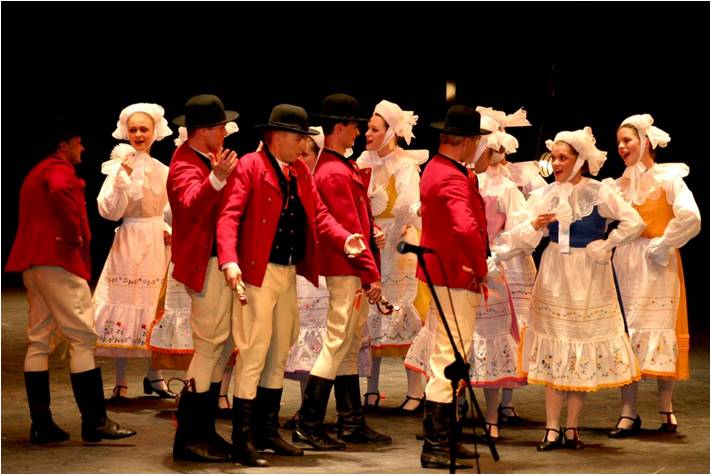 “Poznan AWF" Folk Dance Ensemble was established in 1982. Since its establishment it has been managed by Dariusz Majchrowicz. Ensemble members are students of the Poznań University of Physical Education and other universities in Poznań, secondary school students and other adults who share their interest in folklore. The ensemble aims to preserve national traditions and customs. The band is composed of six musicians (violin, clarinet, accordion and double bass).The ensemble has performed in many countries in Europe and worldwide. It has organised folklore festivals and the "Integracje 2001" and "Integracje 2002” World Folklore Festivals. Students work really hard practising their dancing skills. Dancing on the stage in Poland and abroad they prove that folklore can be attractive. The organisation of the “Integracje” World Folklore Festival is how they combine hard work with their passion for dancing. Friendships which started during dancing practice sometimes last for life.
“Poznan AWF" Folk Dance Ensemble was established in 1982. Since its establishment it has been managed by Dariusz Majchrowicz. Ensemble members are students of the Poznań University of Physical Education and other universities in Poznań, secondary school students and other adults who share their interest in folklore. The ensemble aims to preserve national traditions and customs. The band is composed of six musicians (violin, clarinet, accordion and double bass).The ensemble has performed in many countries in Europe and worldwide. It has organised folklore festivals and the "Integracje 2001" and "Integracje 2002” World Folklore Festivals. Students work really hard practising their dancing skills. Dancing on the stage in Poland and abroad they prove that folklore can be attractive. The organisation of the “Integracje” World Folklore Festival is how they combine hard work with their passion for dancing. Friendships which started during dancing practice sometimes last for life.Contact:
Zespół Tańca Ludowego „Poznań”
Akademii Wychowania Fizycznego
Dom Studencki AWF
ul. Św. Rocha 9
61-142 Poznań Zespół Tańca Ludowego AWF Poznań
tel. 61 835 54 34; +48 504 226 408
email:
www.ztl.awf.poznan.pl
videoblog: www.ztlpoznan.blox.pl/html
www ŚPF INTEGRACJE: www.festiwal.awf.poznan.pl
Promotional video:
http://www.youtube.com/watch?v=U6acKpbv0Yw
Art director: Dariusz Majchrowicz
FACULTIES, MAJORS AND SPECIALISATIONS
Majors:
• Physical education
• Sport
• Dance in Physical Culture
• Tourism and Recreation
Faculty of Health Sciences
Majors:
• Physiotherapy
• Dietetics
• Neurobiology
Poznan University of Physical Education offers:
First cycle, Bachelor studies (3 years)
• Physical Education
• Sport
• Tourism and Recreation
• Dietetics
• Dance in Physical Culture
Physiotherapy - long-cycle studies (5 years)
Second cycle, Masters studies (2 years)
• Physical Education
• Sport
• Dietetics
• Dance in Physical Culture
• Tourism and Recreation
• Neurobiology
The graduates of the Physical Education major are prepared to programme, plan and implement compulsory physical education in schools and special education centres as well as plan and coordinate training in competitive sport, disabled sport, sport management.
The graduates of Physiotherapy major are prepared to programme, plan and implement rehabilitation process in dysfunction of motor organ and internal organs, as well as run corrective gymnastics in schools.
Physiotherapy graduates usually find employment in:
• public and non-public health centres (as rehabilitation specialists, massage therapists),
• spa centres and sanatoriums,
• schools, kindergartens as specialists for corrective and compensative gymnastics,
• sport recovery centres.
Graduates of Tourism and Recreation are prepared to work in travel agencies, hotels, sport and recreation centres, state government and local government administration and other organisations and institutions dealing with popularisation and organisation of tourism and recreation.
CALENDAR OF THE ACADEMIC YEAR
Public holidays
• the 1st of January - New Year’s Day
• the 6th of January – Epiphany (“Three Kings”)
• Easter Sunday, Easter Monday
• the 1st of May – International Worker’s Day
• the 3rd of May - Constitution Day
• the Feast of Corpus Christi - variable
• the 15th of August - Assumption of the Blessed Virgin Mary
• the 1st of November - All Saints’ Day
• the 11th of November – Independence Day
• the 25th and 26th December – Christmas Day, Boxing Day
Information Sheet - academic calendar
ACCOMODATION
The AWF Residance
Rocha street No 9
61-142 Poznań
Price: 3-bed rooms – 410 PLN /per month/per person (379,63 pln + 8% VAT)
2-bed rooms – 432 PLN /per month/per person (400 pln + 8% VAT)
Price for incompleted rooms:
3-bed into 2-bed – 465 PLN /per person/per month (430,55 pln + 8% VAT)
2-bed into 1-bed – 560 PLN /per person/per month (518,52 pln + 8% VAT)
-kitchen on every floor
-laundry on the ground floor,
-high speed internet access (payment must be done by the student)
The room with heating is bedding and furnished.
Lack of equipment kitchen (kettle, cutlery, plates, pots etc.) and bathroom ( brushes, cleaning fluids etc).
We CAN NOT guarantee smaller rooms (incompleted).
Deposit: price according to room's payment in case any damage in students room payed in the beginning of stay.
Welcome to Poznań
HISTORY OF POZNAŃ
Green areas take up a substantial part of the city. Public parks and woods account for approx. 20% of the area of Poznań. The city has around 40 parks covering the area of over 2500 acres with 270 square feet per each resident – making it the highest proportion in large cities in Poland. There are four large lakes in Poznań, two natural ones, Kierskie and Strzeszyńskie, and two man-made lakes, Rusałka and Malta, with many holiday centres and bathing beaches.
Poznań - a cultural centre
As far as culture is concerned, musical events are the most eminent forms of cultural activities in Poznań. The International Henryk Wieniawski Violin Competition, held every 4 years, has gained world-wide importance. Poznań is also famous in the world for its choirs: Boys' and Men's Choir of Poznań Philharmonic Poznańskie Słowiki ("Poznań Nightingales"), Poznań Boys' Choir and the Cathedral Choir. The Opera House – one of the leading opera theatres in the country, the Polish Dance Theatre – Poznań Ballet and the Amadeus Chamber Orchestra are well known to the public. There are three dramatic theatres, a musical theatre, animation theatre as well as 64 art galleries, 12 cinemas and 21 public and scientific libraries. The festival of contemporary music Poznańska Wiosna Muzyczna (Poznań Musical Spring) is held every year. The Museum of Musical Instruments, which is unique in Poland and only the second in Europe, has been organising concerts of early music as well as the Festival of Celtic Music. Moreover, every year the MALTA International Theatre Festival takes place. One can also listen to some jazz music - Poznań Jazz Fair is a meeting of the greatest celebrities of Polish and world jazz.
Poznań - an industrial centre
Poznań is a significant industrial centre; about 2.5% of global industrial output of the country is produced in this city. About 80,000 people are employed in the industry, which is over 30% of all the people employed in Poznań. Major industries include metal industry, automotive industry, electrotechnical engineering industry and chemical industry.
Poznań - a trade centre
Poznań is a great centre of domestic and international trade. Every year the Poznań International Fair is visited by producers, tradesmen and journalists from all over the world. There are international exhibitions, exchanges and trade fairs in the grounds of the Poznań International Fair every spring and autumn.
Poznań - a scientific centre
Poznań is one of the largest scientific centres in Poland with 7.5% of the total number of independent research workers. It has the third largest number of research institutions in Poland, after Warsaw and Cracow.
Poznań is an important academic centre in Poland with eight state higher education institutions, including five universities, and twenty non-public higher education institutions (2012), including:
• Uniwersytet im. Adama Mickiewicza (Adam Mickiewicz University)
• Uniwersytet Medyczny im. Karola Marcinkowskiego (Poznań University of Medical Sciences)
• Uniwersytet Przyrodniczy (Poznań University of Life Sciences)
• Uniwersytet Ekonomiczny (Poznań University of Economics)
• Uniwersytet Artystyczny (University of Arts)
• Politechnika Poznańska (Poznań University of Technology)
• Akademia Muzyczna im. Ignacego Jana Paderewskiego (Ignacy Jan Paderewski Academy of Music)
• Akademia Wychowania Fizycznego im. Eugeniusza Piaseckiego (Poznań University of Physical Education)
In 2012 there were 135 thousand students in Poznań.
LIVING IN POZNAŃ
Arriving by plane
Poznań Ławica Airport offers a number of traditional and low cost flights to major European airports, including Barcelona, Copenhagen, Dublin, Frankfurt, London, Munich, Oslo.
The list of destinations and other information can be found on the airport website: www.airport-poznan.com.pl/en
The airport is located 7 km outside the city centre. You can get from the airport to the centre by a city bus (line 159 and express line L) which runs between the airport and the railway station. After 11 pm you can take a night bus (line 242). Tickets can be purchased in newsagents and in ticket machines. It takes around half an hour to get from the airport to the city centre.
Arriving by train
Poznań Main Railway Station is located within 15 minute walk from the University, near the city centre and next to the Poznań International Fair.
The train journey from Berlin to Poznań takes only 3 hours and the journey from Warsaw to Poznań 3.5 hours.
All trains coming to Poznań stop at the Main Railway Station (Poznań Główny). The Station includes two buildings: the Main Hall connected with the bus station and located above platforms 1, 2 and 3 and the West Station (Dworzec Zachodni). It is a part of an integrated communication centre which apart from the new railway station includes a bus terminal, car park, bicycle parking facility and a large shopping centre.
You can get to the University (AWF) by trams number 5 and 6 from Poznań Głowny tram stop.
Train timetable in English is available at: http://rozklad-pkp.pl
Arriving by car
You can get to Poznań by car on A2 toll motorway (from the west; access from the east: from Konin, Modła road junction), national routes no. 92 and 5 (east - west) and no. 11 (north - south). In the city centre you have to pay for the parking at the parking machine and display the ticket behind the windshield. The Parking Zone is marked with road signs.
Speed limits for cars in Poland:
• build up area (towns and villages) - 50 km/h
• single carriageways - 90 km/h
• dual carriageways - 100 km/h
• motorways - 130 km/h
Arriving by bus
The bus station is situated at Matyi Street and is connected with the railway station. It serves both domestic and international bus connections. A tram stop Poznań Główny is located opposite the bus station. You can get to the AWF by trams number 5, 6.
Bus and tram timetables can be found at: https://www.ztm.poznan.pl/en/
Accommodation:
Each student in the Erasmus+ programme can apply for a place in a student’s dormitory.
Address: Dom Studencki ul. Św. Rocha 9, 61-142 Poznań
email:
Contact person: Mrs. Beata Cicha
Telephone: (061) 875 14 23
The dormitory building is located only 1 km from the AWF building. It is only one tram stop or a 10 minute walk to your classes.
The students’ dormitory of the AWF offers:
- single, double or three-bed rooms,
- shared bathroom facilities (one bathroom and toilet for every two rooms),
- kitchen on every floor,
- laundry on the ground floor,
- high-speed internet access.
In the ground floor there is a gym hall, a canteen, where you can eat well and quickly, a copying point and a small shop.
There are great leisure areas located within a ten minute walk from the dormitory: the Malta Lake and the Warta river.
Monthly cost of accommodation: see Information about AWF- accomodation.
Deadline for accommodation application: see application deadlines.
Cost of living
To give you an idea of the amount of money you will need as a student in Poznań we prepared a one month budget below.
The suggested amount will only cover modest expenses, but still ensures a proper standard of living during your stay.
Currency exchange rate:
EUR 1 = ca PLN 4.56 (NBP-17.08.2021)
USD 1 = ca PLN 3.87 (NBP-17.08.2021)
Standard student budget:
milk (1 l) – PLN 3-5
10 eggs – PLN 5-10
a pack of tea – PLN 5-20
potatoes – PLN 1.80-3,0/kg
a packet of coffee – PLN 5-20
meat – PLN 10-50/kg
coca-cola – PLN 3-5
vegetables – PLN 2-5/kg
a loaf of bread – PLN 3-6
fruit - PLN 3-10/kg
a packet of butter – PLN 6-8
cheese – PLN 10-30/kg
ham – PLN 15-50/kg
a drink in a pub – PLN 10-20
a beer in a pub – PLN 5-10
a cinema ticket – PLN 15-25
a theatre ticket – PLN 25-100 zł
According to the Central Statistical Office of Poland the average monthly expenditure in the Wielkopolska region in 2017 was PLN 1051.38 per person (information from the GUS website).
Climate
Poznań is located in the area of moderate climate, affected mainly by the maritime climate (mild and humid) and to a smaller extent by continental climate (frosty winters and hot summers). The rainfall in Poznań is one of the lowest in Poland and usually distinct four seasons occur.
The temperatures range from -15°C to 5°C in the winter and from 15°C to 35°C in the summer.
Everyday life in Poznan
Emergency phone numbers
112 – is the emergency number used in the landline network in the European Union and in the mobile network all over the world. 112 should be dialled when two emergency services are needed. If the emergency situation requires calling only one service, dial the specific emergency phone number.
Ambulance service: 999
Fire brigade: 998
Police: 997
Emergency road service: 981
Public transport
Buses and trams in Poznań are usually punctual and timetables are displayed at bus and tram stops. Time tickets are valid for trams and buses. There are a number of various long-term, single line and whole networks tickets available. Fares information can be found at:
Tram and bus timetables can be found on the website of MPK (the City Public Transport Company):https://www.ztm.poznan.pl/en/cennik
Post Offices
Most post offices are open from Monday to Friday from 8 am to 6 pm.
Banks
Poznań is a large banking centre, the second most important centre in the country. The city is the seat of many banks, head offices and branches, including several foreign banks. Banks are open from Monday to Friday from 8 am to 6 pm. The main banks in Poznań are listed below:
• Santander Bank Polska SA, Pl. Wolności 15, 60-967 Poznań, phone +48 61 856 49 02
• Narodowy Bank Polski - Oddział Okręgowy w Poznaniu, Al. Marcinkowskiego 12, 60-967 Poznań,
phone +48 61 851 42 00
• Powszechna Kasa Oszczędności BP S.A. - I Oddział Centrum, Pl. Wolności 3, 60-914 Poznań, phone +48 61 855
50 00, 61 855 51 01, 61 855 52 25
In most Poznań’s main streets you can find cash machines accepting a variety of credit cards including VISA, EUROCARD, MASTERCARD.
Currency
Polish currency unit - 1 złoty (zł, PLN) = 100 groszy (gr)
Notes: PLN 10, 20, 50, 100, 200, 500
Coins: PLN 1, 2, 5 and 1, 2, 5, 10, 20, 50 groszy.
Money can be exchanged in banks, hotels and exchange offices (called "kantors").
Most shops and restaurants accept credit cards.
Sport facilities
In Poznań there are 20 stadiums and sports fields, a car racing track, a kayaking and rowing race course, a horse race course, an Arena sports and concert hall. There is also Malta Ski Centre, open year round, with the artificial surface of a slope as well as a hockey pitch with an artificial grass surface. Those who like swimming can spend time in one of indoor or outdoor pools:
- Termy Maltańskie - ul. Termalna 1,
- Poznań Centre of Sports and Recreation - ul. Chwiałkowskiego 34,
- Olimpia - ul. Warmińska 1,
- Posnania - ul. Słowiańska 78,
- Atlantis - Os. Stefana Batorego 101.
You can also visit one of the gyms, fitness clubs and bowling centres.
Pubs & clubs
Here are some recommended addresses:
- Trops - our university club, ul. Rocha 9
- Cicibór - in a student’s dormitory called Jagienka, ul. Obornicka 18
- Eskulap - very popular with students, the venue of many concerts, ul. Przybyszewskiego 39
- The Dubliner - al. Niepodległości 19, a good traditional Irish pub
- Blue Note Jazz Club - CK Zamek, ul Kościuszki 79
- Cuba Libre - ul. Wrocławska 21
Gardens
The Botanical Gardens - ul. Dąbrowskiego 165, open from May to October. Founded in 1925, are home to approx. 7000 species of plants.The Poznan Palm House - ul. Matejki 18.
Visit the Palm House and you will find yourself in a tropical climate without leaving Poznań. Surrounded by exotic plants you will also see some exotic animals and aquaria with 170 species of fish.
www.palmiarnia.poznan.pl
The Old ZOO - ul. Zwierzyniecka 19, situated in the city centre. The zoo was opened in 1874 and is very popular with the residents of Poznań. A new pavilion for reptiles, amphibians and fish was opened in 2012.
The New ZOO - ul. Krańcowa 53, opened in 1974. It is one of the largest zoological gardens in Poland. Set in 280 acres of woodland, it is home to 2000 animals representing 150 species.
www.zoo.poznan.pl
Culture & entertainment
Cinemas
There are many cinemas with a very diverse repertoire.
The best cinemas are:
• Kinepolis (ul. B. Krzywoustego 72)
• Multikino (ul. Królowej Jadwigi 51)
• Multikino Stary Browar (ul. Półwiejska)
• Cinema City and Imax (Poznań Plaza)
• Muza (ul. Św. Marcin 30)
Museums
The most interesting museums in Poznań include the National Museum (Gallery of Painting and Sculpture), Museum of the History of Poznań, Museum of Musical Instruments and Poznań Archaeological Museum.
Theatres and concert halls
There are many theatres in Poznań: Teatr Polski, Teatr Nowy, Teatr Animacji, Teatr Ósmego Dnia, Musical Theatre, Polish Dance Theatre and Stanisław Moniuszko Opera House as well as concert halls: Arena - a sports and concert hall (ul. Wyspiańskiego 33), Aula Uniwersytetu Adama Mickiewicza, (ul. Wieniawskiego 1), Sala Ziemi MTP, (ul Głogowska 14).
Restaurants
If you want to eat out in Poznań, you will find something for every taste and budget. You will be able to try Polish and international cuisine. There are also many fast-food restaurants e.g. McDonald’s, Pizza Hut, KFC etc.
Libraries
The Adam Mickiewicz University Library (ul. Ratajczaka 38/40) is the largest library in the city. Opening hours: Mon.-Fri. 10 am – 8 pm, Saturdays 10 am - 5 pm. There are also twelve scientific libraries with a total collection of 7 million books. They usually belong to particular colleges.
Other libraries:
- The British Council Library - Biblioteka Brytyjska Uniwersytetu im. Adama Mickiewicza, ul. Międzychodzka 5
Telephone +48 61 829 27 25, email:
Opening hours: Mon. - Fri. 10am – 6 pm, Saturday 10 am – 2 pm
- The Austrian reading room - ul. Zwierzyniecka 7
Opening hours: Mon. - Fri. 9.30 am – 4.30 pm, Saturdays 10 am – 2 pm
Bookshops & newsagents
There are a number of bookshops selling foreign-language books, newspapers and magazines.
- Akapit - ul. Dąbrowskiego 64,
- American English Society Ltd Bookshop - ul. Grunwaldzka 11,
- EMPIK bookshop chain with sections selling foreign books, magazines, music and films ( Empik Megastore, ul.Ratajczaka 44, Empik Poznan Plaza, ul. Drużbickiego 2, Empik King Cross, ul. Bukowska 156),
- Polanglo ul. Kościuszki 71/73
CONSULAR AGENCIES
• Consulate of the French Republic
ul. Św. Marcin 80/82 (CK Zamek, room 247), 61-809 Poznań
Telephone +48 61 851 94 90
Fax +48 61 851 94 90
• Consulate of the Czech Republic
ul. Żegiestowska 11/13, 60-466 Poznań
Telephone +48 697 388 186
• Consulate of the Federal Republic of Germany
ul. Gołębia 3/1, 61-834 Poznań
Telephone +48 668 134 395
Fax +48 61 64 68 750
• Consulate of the Republic of Lithuania
ul. Szyperska 14 room P-6, 61-754 Poznań
Telephone +48 61 671 16 60
• Consulate of the Slovak Republic
ul. Św. Marcin 80/82 (CK Zamek, room 203), 61-809 Poznań
Telephone +48 61 853 70 85
Fax +48 61 853 70 85
• Consulate of the Republic of Turkey
Stary Rynek 78/79 - Pałac Działyńskich, 61-772 Poznań
Telephone +48 61 852 48 44, +48 61 852 89 29
Fax +48 61 851 70 96
• Consulate of Hungary
ul. Gniewska 87, 60-454 Poznań
Telephone +48 61 841 01 40
Fax +48 61 841 01 40
• Consulate of Romania
ul. Maciejewskiego 20/2, 61-606 Poznań
Telephone +48 61 825 78 66, +48 501 56 90 33
Fax +48 61 825 78 66
• Consulate of the United Kingdom
ul. Święty Marcin 80/82, 60-844 Poznań
Telephone +48 61 665 88 50
• Consulate of the Kingdom Denmark
ul. Strusia 10, 60-711 Poznań
Telephone +48 61 866 26 28
Fax +48 61 865 82 56
• Consulate of the Kingdom of Belgium
ul. Kmicica 2, 60-177 Poznań
Telephone +48 61 436 79 69
Fax +48 61 436 74 83
• Consulate of Ukraine
ul. Grobla 27 A/6, 61-858 Poznań
Telephone +48 61 622 74 01
Fax +48 61 855 34 53
ul. Zeylanda 3 flat 4, 60-808 Poznań
Telephone +48 61 278 57 10, 512 388 824
• Honorary Consulate of Finland
ul. Wawrzyniaka 10, 60-505 Poznań
Telephone 601 917 492
Wspomnienia pracowników
Regulamin finansowania wyjazdów
OUTGOING - kontakt
czynne: od poniedziałku do piątku, godz. 10.00 - 14.00
Nowy Budynek Dydaktyczny, pok. 116
Tel.: 61 835 50 66
e-mail: (studia) | (praktyki)
Koordynator Uczelniany:
mgr Małgorzata Nawrocka
Koordynatorzy Wydziałowi:
Wydział Nauk o Kulturze Fizycznej
dr Wojciech Jarosz
Dyżur: kontakt mailowy
wejście C, pokój 310
Tel. 61 835 52 46
Wydział Nauk o Zdrowiu
dr Magdalena Goliwąs
Dyżur: kontakt mailowy
wejście C, pok. 127
tel. 61 8355146
Wszelkie informacje dot. Programu ERASMUS+ są udzielane studentom na spotkaniach zorganizowanych przez Biuro programu. Informacje o dokładnym terminie spotkania umieszczane są na stronie internetowej uczelni oraz na tablicach informacyjnych Programu ERASMUS+.
Spotkania informacyjne dla studentów organizowane są tylko raz w roku (najczęściej na przełomie lutego/marca) i tylko raz w roku dokonywany jest nabór studentów na wyjazd w ramach Programu ERASMUS+ na przyszły rok akademicki.
Zapamiętaj i nie przegap swojej okazji!
Dokumenty do pobrania
ERASMUS+
Studia- Erasmus+ Application Form
- Learning Agreement - studia
- Wykaz uczelni - Erasmus code
- Wykaz ocen dla uczelni partnerskiej (Transcript of Records) - formularz należy wypełnić w języku angielskim w porozumieniu z koordynatorem wydziałowym
- certyfikat językowy
- Zaświadczenie do Działu Obsługi Studenta
- Oświadczenie bankowe
- Registration Letter
- Certyfikat
- Formularz przedłużenia pobytu na studiach
- Zgoda na wyjazd
- Learning Agreement - praktyki
- Letter of Intent - praktyki
- Zaświadczenie z Działu Obsługi Studenta
- Oświadczenie bankowe
- Registration Letter
- Certyfikat
- Clinical Placement's Description (dzienniczek praktyk) - Fizjoterapia (należy przygotować w systemie tygodniowym)
- Placement's Description (dzienniczek praktyk) - WFiS, TIR
- Evaluation Form - Fizjoterapia
- Evaluation Form - WFiS, TIR
- Sprawozdanie z praktyki zagranicznej
PO WER
- Erasmus+ Application Form
- Learning Agreement - studia
- Wykaz uczelni - Erasmus code
- Wykaz ocen dla uczelni partnerskiej - formularz należy wypełnić w języku angielskim w porozumieniu z koordynatorem wydziałowym
- Zaświadczenie z Działu Obsługi Studenta
- Oświadczenie bankowe
- Registration Letter
- Certyfikat
- Dane uczestnika - wsparcie socjalne - tylko dla studentów, którzy uzyskali prawo do wsparcia socjalnego krajowego na podstawie decyzji wydziałowej komisji uczelnianej.
- Oświadczenie uczestnika projektu
Praktyki
Portale internetowe pomocne przy wyszukiwaniu potencjalnych miejsc odbywania praktyk:
a) http://www.praxisnetwork.eu/ - może służyć jako wsparcie w poszukiwaniu przez studentów miejsc odbywania praktyk zagranicznych w Portugalii.
b) „JOE+” – the Job Offer Exchange platform;
Jest to inicjatywa sieci LEO-NET, znanej uczelniom, które były beneficjentami zakończonego już programu Leonardo da Vinci, a który jest kontynuowany jako program Erasmus+ Kształcenie i szkolenia zawodowe. Więcej informacji – bezpośrednio na stronie JOE+ https://leonet.joeplus.org/en/
c) http://erasmusintern.org/ - portal umożliwia także poszukiwanie przez studenta praktyki dostosowanej do jego oczekiwań.
Informacje dla studentów wyjeżdżających do Turcji
Potwierdzone informacje o zasadach legalizacji pobytu uczestników oraz inne informacje związane z funkcjonowaniem w Turcji programu Erasmus+ znajdują się na podstronie:
http://ankara.msz.gov.pl
Studenci muszą zalegalizować swój pobyt w Turcji bezzwłocznie po przyjeździe. Niedotrzymanie obowiązującego terminu grozi sankcjami karnymi.
Zwracamy uwagę, że pomoc uczelni tureckiej w poświadczaniu dokumentów dotyczy studentów wyjeżdżających na studia. Studenci wyjeżdżający na praktykę będą zobowiązani do przedstawienia tłumaczenia polisy ubezpieczeniowej na język turecki, poświadczonego notarialnie w Turcji.
W załączeniu przesyłamy informacje z tureckiej Narodowej Agencji o legalizacji pobytu w Turcji.
10 Things to Do for Erasmus+ Exchange Students in Turkey
Tryb odbywania i zaliczania częściowych studiów/praktyk
Rozliczenie wyjazdu
Rozliczenie wyjazdu — studia
1. Przesłać do Sekcji Współpracy z Zagranicą (SWZ) w ciągu 3 dni od daty przyjazdu do uczelni partnerskiej skan formularza „Registration Letter" potwierdzony przez uczelnie przyjmującą (pkt 4.1. umowy)
2. Dostarczyć do SWZ w terminie do 30 dni od oficjalnej daty zakończenia studiów oryginały/kopie następujących dokumentów:
a) Certyfikat, potwierdzający rzeczywisty okres pobytu w uczelni partnerskiej (dokumenty do pobrania)
b) Learning Agreement for Study w wersji on-line (wszystkie części : before, during and after mobility), potwierdzający, że zaplanowany program studiów został zrealizowany w czasie określonym w pkt. 2.2 umowy finansowej
c) informację o realizowanych przedmiotach, zdanych egzaminach i uzyskanych ocenach („Wykaz zaliczeń" – Transcript of Records).
Wszystkie dokumenty rozliczeniowe muszą być potwierdzone przez uczelnię partnerską (podpis koordynatora oraz pieczęć uczelni partnerskiej).
Należy wypełnić Ankietę Stypendysty Erasmusa+ - zostanie przesłana na adres mailowy studenta. Wypełnienie tego zobowiązania jest warunkiem koniecznym do pozytywnego rozliczenia studenta z wyjazdu.
Rozliczenie wyjazdu — praktyka
Zgodnie z podpisywaną na wyjazd stypendialny umową finansową każdy student wyjeżdżający w ramach programu Erasmus+ zobowiązany jest:
1.Przesłać do SWZ w ciągu 3 dni od daty przyjazdu do instytucji przyjmującej scan formularza „Registration Letter” potwierdzony przez instytucję przyjmującą (pkt 4.1. umowy).
2.Dostarczyć do uczelni macierzystej (SWZ) w terminie do 30 dni od oficjalnego terminu ukończenia praktyki, oryginały/kopie następujących dokumentów:
a) zaświadczenie o okresie pobytu w instytucji przyjmującej, zawierające faktyczną datę rozpoczęcia i zakończenia praktyki – Traineeship Certificate - After the mobility,
b) zaświadczenie o zrealizowaniu założeń programowych praktyki z jej oceną wystawioną przez opiekuna praktyki w instytucji przyjmującej – Student Placement Evaluation Form,
c) sprawozdanie z praktyki
d) dzienniczek praktyk.
Należy wypełnić Ankietę Stypendysty Erasmusa+ według wzoru i w formie wymaganej przez Uczelnię oraz końcowy test językowy . Wypełnienie tego zobowiązania jest warunkiem koniecznym do pozytywnego rozliczenia studenta z wyjazdu.
Kursy i testy językowe OLS
Testy biegłości językowej i kursy językowe
Od 01.01.2015 zgodnie z wytycznymi polskiej Narodowej Agencji programu Erasmus+ wszyscy uczestnicy programu wyjeżdżający na studia za granicą lub praktykę zagraniczną w ramach programu Erasmus+ zobowiązani są do wypełnienia testu językowego przed i po mobilności w ramach Online Linguistic Support (OLS). Wymóg ten dotyczy studentów, dla których językiem wykładowym (studia)/roboczym(praktyki) jest: angielski, francuski, hiszpański, niderlandzki, niemiecki lub włoski.
OLS dla wyjeżdżającego studenta oznacza:
- wypełnienie obowiązkowego testu biegłości językowej w terminie określonym przez uczelnię po otrzymaniu informacji z OLS;
- udział w kursie językowym on-line wyłącznie w języku, w którym został wypełniony test biegłości językowej; dostęp do kursu językowego będzie możliwy przez taki czas jaki został podany przez uczelnię w OLS jako czas trwania stypendium licząc od pierwszego logowiania, np. pobyt 6 miesięczny: pierwsze logowanie się studenta 10.10.N, dostęp do kursu do 10.04.N+1;
- na dwa tygodnie przed końcem pobytu uczestnik, który wypełnił pierwszy test językowy otrzyma maila z linkiem do drugiego testu do wypełnienia w terminie określonym przez uczelnię (z wypełnienia drugiego testu językowego zwolnieni są studenci, którzy z pierwszego testu uzyskali wynik C2).
Test biegłości językowej:
- jest obowiązkowy do wypełnienia przed i po mobilności;
- minimalny poziom językowy wymagany do wyjazdu: B1
- student otrzyma mail z wynikami testu biegłości językowej;
Funkcje systemu OLS dotyczące kursów językowych on-line:
- language courses: z możliwością doskonalenia kompetencji: czytanie, pisanie, gramatyka, słownictwo, komunikacja; o charakterze MOOC (Massive Open Online Course) na wybranym przez uczestnika poziomie;
- tutoring: klasa wirtualna, zajęcia z nauczycielami odbywają się co drugi tydzień i trwają 0,5 h w godzinach od 9:00 do 16:00, na zajęcia słuchacze się zapisują;
- forum: nauczyciele odpowiadają na pytania uczestników;
- news;
- level test: test na zakończenie kursu on-line.
Źródło: Fundacja Rozwoju Systemu Edukacji, Narodowa Agencja Programu Erasmus+
Szczegółowe informacje:
http://erasmusplusols.eu/pl
Praktyczne wskazówki dla studentów
Ubezpieczenia
Za zapewnienie ubezpieczenia obowiązkowego jest odpowiedzialny Uczestnik wymiany stypendialnej.
1. Ubezpieczenie zdrowotne
Uczestnik oświadcza, że posiada ubezpieczenie kosztów leczenia oraz zna zakres tego ubezpieczenia np. Europejska Karta Ubezpieczenia Zdrowotnego w przypadku wyjazdu do kraju UE i/lub prywatne ubezpieczenie o równorzędnym zakresie w przypadku wyjazdu do kraju nie będącego członkiem UE. Zaleca się wykupienie przez Uczestnika dodatkowego ubezpieczenia prywatnego obejmującego koszty ewentualnych dodatkowych interwencji medycznych ( dotyczy również zdarzeń związanych z COVID-19, ratownictwa medycznego bądź transportu do kraju. Kopię karty lub/i polisy należy dostarczyć w dniu podpisywania umowy.
2. Ubezpieczenie od odpowiedzialności cywilnej (dotyczy szkód spowodowanych przez Uczestnika w czasie odbywania studiów/praktyki).
Ubezpieczenie od odpowiedzialności cywilnej obejmuje koszty ewentualnych szkód wyrządzonych przez Uczestnika podczas pobytu na studiach/praktyce (w czasie i poza godzinami). Za zapewnienie ubezpieczenia obowiązkowego OC jest odpowiedzialny Uczestnik. Kopie polisy należy dostarczyć w dniu podpisywania umowy.
Studenci wyjeżdżający na praktykę mają obowiązek wykupić ubezpieczenie OC z tytułu wykonywanej praktyki (jako pierwszej pracy). Karta Euro 26 dotyczy OC tylko w życiu prywatnym.
3. Ubezpieczenie następstw nieszczęśliwych wypadków
Ubezpieczenie obejmuje koszty szkód powstałych wskutek wypadku w miejscu studiów Uczestnika. Uczestnik jest zobowiązany do wykupienia obowiązkowego ubezpieczenia w razie wypadku w miejscu studiów zgodnie z podpisanym Learning Agreement. Ubezpieczenie następstw nieszczęśliwych wypadków musi obejmować koszty szkód jakich może doznać Uczestnik wskutek wypadku w instytucji przyjmującej. Kopię polisy należy dostarczyć w dniu podpisywania umowy.
Zgodnie z powyższymi zapisami należy wykupić następujące ubezpieczenia w zależności od rodzaju wyjazdu stypendialnego:
Wyjazd na studia
Karta Euro26 Sport lub Sport Extra (obejmuje NNW i OC w życiu prywatnym)
Uwaga: studenci kierunku Fizjoterapia realizujący praktyki kliniczne obowiązkowo muszą wykupić OC, tak jak przy wyjeździe na praktykę.
Wyjazd na praktykę
Karta Euro 26 Sport lub Sport Extra (obejmuje NNW i OC w życiu prywatnym)
Stypendia
Stypendia Programu PO WER
Informacje o stypendiach przyznawanych w ramach Programu PO WER dostępne są tutaj — link







